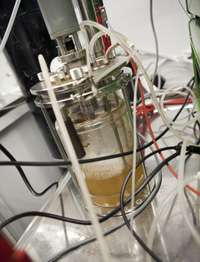Rare sugars are good for you

Rare sugars prevent dental caries, heal infections and sweeten with few calories.
Rare sugars are produced at the Aalto University School of Chemical Technology with the help of genetically modified bacteria.
Contrary to what one might expect, the laboratory that sugar researchers work in does not smell sweet.
'It smells quite bad', admits Heikki Ojamo, Professor of Bioprocess Engineering, and points out the culprits: bacteria in a bioreactor. Professor Ojamo and his research group have genetically modified these bacteria in order to produce enzymes that in turn will produce rare sugars. Rare sugars cannot be extracted in large volumes from natural sources, which has ensured that their prices have remained high. However, new biotechnological production methods have allowed for more effective production and continuous development of new products and methods of use.
Xylitol is the best recognised and most researched rare sugar in Finland. Suomen Sokeri Oy developed an industrial production method for xylitol at the end of the 1960s, and in the 1970s the University of Turku began to research its impact on the prevention of dental caries. Xylitol remains to be the only rare sugar used for dental care, but it has many competitors in the sweetener market.
'Aspartame, psicose, tagatose, neotame, erythritol', Professor Ojamo says.

'Aspartame is over 100 times sweeter and neotame over 10 000 times sweeter than table sugar, i.e. sucrose. The food industry is interested in low calorie options, but up until now the problem has been that sweeteners have tasted bad. We too have produced D-tagatose through enzymatic processing. D-tagatose is very similar in taste to table sugar, but with less than half its energy content. Production volumes are, as of yet, quite small, but at least Pepsi has already shown an interest in this sweetener', Professor Ojamo explains.
Virus medicines and care of wounds
In addition to the food industry, the pharmaceuticals industry is interested in rare sugars. These are already commonly utilised as a raw material for virus medicines, but they have the potential to be much more.
'A great deal of research has been carried out on the use of sugars in the care of infections', says researcher Anne Usvalampi, who recently wrote her dissertation on the microbiological production of rare sugars.
'For example, mannose can be used to treat urinary tract infections. Mannose's effectiveness is based on its ability to cover the adhesion organs of the bacteria causing the infection, whereupon the bacteria cannot remain in the human body and is instead flushed out with urine', Heikki Ojamo explains.
Many of the potential uses of mannose are based on its ability to restrict production of hyaluronan. Hyaluronan is a sugar with large molecules that has an abnormal metabolism in many infection illnesses, such as asthma, rheumatism and chronic cuts and wounds. Tagatose, another rare sugar, has potential in the treatment of diabetes.
'Rare sugars do not increase insulin levels, and as such they are suited for diabetics, but tagatose has been found to even cause a drop in insulin levels', Anne Usvalampi explains.
The Japanese are crazy about xylitol
Research takes time, but the journey from the laboratory to the market is also a long one. Tagatose, for example, was patented in 1988, but the US Food and Drug Administration (FDA) approved it in 2002, and it only reached the market in large volumes in 2007.
'Especially in fields where biotechnology does not have a long history, it is exceedingly difficult to do away with preconceptions', Professor Ojamo admits.
'A lot depends on how much a product is desired in the market.
Provided by Aalto University

















